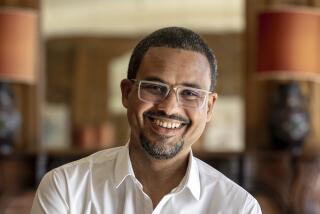Leopold Senghor, 95; African Statesman, Poet
- Share via
PARIS — Leopold Sedar Senghor, a former president of Senegal and poet who won acclaim in Africa’s presidential palaces and France’s universities and literary salons, died at his home in Normandy on Thursday. He was 95.
The cause of death was not reported, but Senghor was believed to have suffered from heart trouble and had been recently hospitalized.
Senghor spent his final years in the French village of Verson, where he had retired after what he called a “triple life” as a political leader, professor and poet.
“Poetry has lost a master, Senegal a statesman, Africa a visionary and France a friend,” French President Jacques Chirac said in a statement Thursday. He called Senghor a “great humanist figure.”
A champion of democracy who was Senegal’s first president and ruled from 1960 to 1980, Senghor was a canny politician who was among modern Africa’s foremost statesmen and a leader of the independence movement by France’s African colonies.
As an academic, he became the first black man elected to the Academie Francaise, a hallowed bastion of French intellectuals and writers, and was an ardent and energetic proponent of French language and literature.
As a poet, he celebrated “negritude,” or blackness, the beauty of African culture. But he also devoted himself to exploring the rich fusion of African culture with European and American influences in artistic forms that he cherished, such as jazz. He was an early and original multiculturalist who called himself an ambassador of “universal civilization.”
“Everyone must root themselves in the values of their race, their continent, their nation, in order to be; then open themselves to other continents, to other races, to other nations, in order to bloom and flower,” Senghor said.
That enlightened and dignified philosophy had its roots in the village of Joal, south of the capital Dakar, were Senghor was born Oct. 9, 1906. He did not learn French until he was 7, but he embraced the language and the culture of Senegal’s colonial ruler. He eventually made the pilgrimage to Paris in the 1930s.
Co-Founded Literary Movement
As a university student at the Sorbonne and other distinguished institutions, he befriended Georges Pompidou, a future president of France, and Aime Cesaire, a Communist poet from the French Antilles. It was with Cesaire that Senghor founded the “negritude” literary movement while studying and teaching French, Latin and Greek.
Senghor joined the Socialist Party and honed his talents and ideas in the intellectual ferment of Paris with other friends, such as philosophers Albert Camus and Jean-Paul Sartre.
Having become a French citizen, Senghor dutifully went to war against the Germans in 1939. He spent time in a German prisoner-of-war camp and participated in the French Resistance after his release.
After World War II, his literary and political careers took off simultaneously. He was elected as a representative of Senegal to the French National Assembly in 1945, the same year that he published “Chants of the Shadow,” a book of poetry.
In the 1950s, Senghor successfully combined his newfound enthusiasm for African nationalism with his profound ties to French politics and culture. He played a vital role in winning independence for Senegal from the government of President Charles de Gaulle. Senghor was elected president of his newly independent homeland in 1960.
As president, he skillfully built and retained a political base in a predominantly Muslim electorate, although he was Catholic and had once studied for the priesthood.
His regime was considered unusually tolerant and democratic compared to the tyrannies and kleptocracies that emerged in newly independent African states.
But he was tough too, imprisoning a political rival for 12 years. Despite his leftist political background, Senghor steered clear of the Soviet Union and Cuba, which he thought were flexing their muscles in Africa for motives based more on power and ideology than the well-being of Africans.
In 1980, Senghor stepped down after one of his proteges won the presidency, capping an illustrious political record with a graceful and democratic departure.
Hailing Senghor’s significance for the continent of his birth and the European nation he embraced, Le Monde newspaper commented Thursday: “With the death of Leopold Sedar Senghor, post-colonial Africa loses one of its historic figures and France a symbol of Francophone culture and of its relationship with Africa.”
With the presidency behind him, Senghor quickly abandoned politics for the world of letters, winning acceptance in the Academie Francaise in 1983. He left Africa behind as well, moving to Normandy, the home region of his second wife, a Frenchwoman named Colette Hubert, to whom he was married until his death. He had three children, two of whom died, tingeing his later years with a melancholy that was reflected in his poetry.
The former president was considered for the Nobel Prize for literature, but that honor was not added to a host of commendations that he won from universities around the world and the French government.
Although a man of many talents and interests, Senghor saw himself primarily as a poet and dedicated the rest of his life to literature. Police said he died at home Thursday afternoon.
In a literary definition that described his own experience as well, he once said that poetry was “the most accomplished form of culture” and “the foundation and ultimate goal of politics.”
More to Read
Sign up for Essential California
The most important California stories and recommendations in your inbox every morning.
You may occasionally receive promotional content from the Los Angeles Times.













